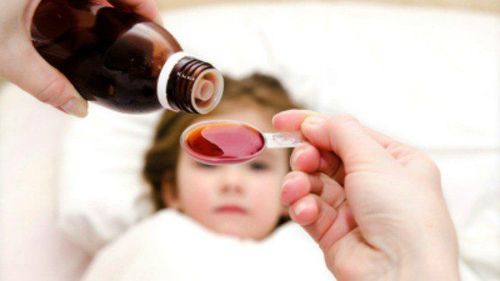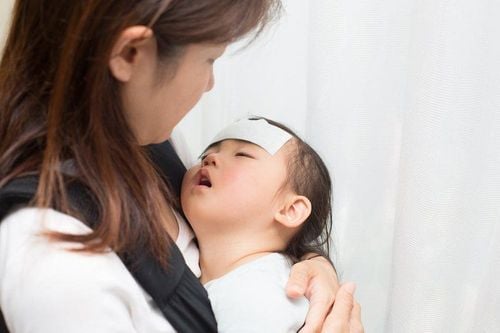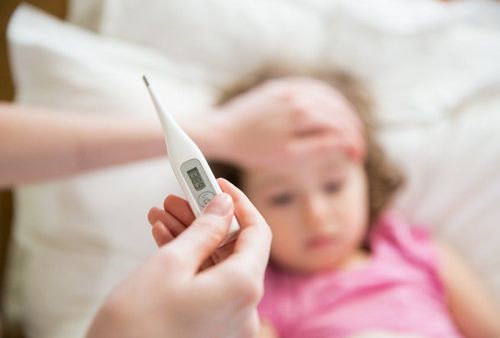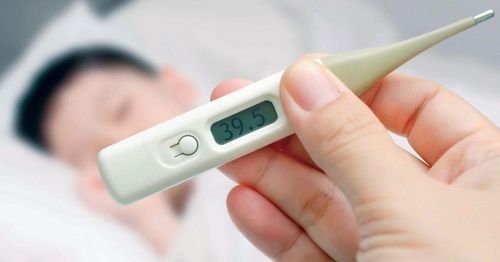Viral fever in children is a common illness, especially during seasonal transitions. It can cause various dangerous complications, so parents must understand this condition to respond appropriately if their child contracts it.
1. What is viral fever in children?
Fever is a condition where body temperature rises above normal (defined as 38°C or higher when measured rectally, or 37.5°C or higher when measured in the armpit). It is the body's defense mechanism against external agents, helping inhibit the growth of pathogens (commonly bacteria and viruses).
Viral fever occurs when a child is infected with various viruses, such as Rhinovirus, Adenovirus, Influenza virus, etc. It is most common during seasonal transitions when the weather changes abruptly from hot to cold or vice versa.
Trắc nghiệm: các chỉ số cần chú ý về sự phát triển thể chất của trẻ
Chiều cao, cân nặng của bé ở từng giai đoạn nên là bao nhiêu là bình thường, bao nhiêu là bất thường? Cùng ThS.BS Ma Văn Thấm điểm lại xem bạn đã nắm được các chỉ số phát triển thể chất của bé chưa nhé!The following content is prepared under supervision of Thạc sĩ, Bác sĩ y khoa, Ma Văn Thấm , Nhi , Phòng khám Đa khoa Vinmec Dương Đông(Phú Quốc)
2. Symptoms of viral fever in children
The symptoms of viral fever can resemble many common illnesses, so parents must closely monitor their child’s health to detect and treat the condition promptly. In the early stages, children often experience fatigue, body aches, and fever, which can vary from mild to high and may be continuous or intermittent.
Other symptoms include sore throat, runny nose, nasal congestion, red eyes, headache, joint pain, muscle pain, coughing, rash, and irritability. Without timely treatment, the illness may progress to the acute stage, with specific signs such as high fever episodes, seizures, potential coma, and life-threatening complications.
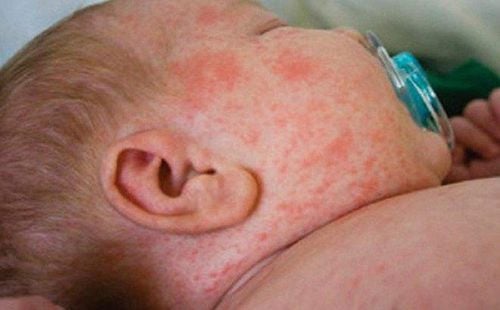
Parents should take their child to a doctor immediately if they notice the following symptoms:
- Persistent high fever for more than two days, cold limbs, unusual shivering.
- Widespread rash.
- Abdominal pain, vomiting, diarrhea.
- Blood-streaked stools or black stools.
- Severe headache or startling during sleep.
- Seizures.
- Rapid, deep, or labored breathing.
3. How long does viral fever last?
The symptoms of viral fever typically worsen quickly but tend to subside within 3–5 days. With proper treatment, the child should fully recover within 7–10 days. However, parents should remain vigilant, as viral fever can progress rapidly, and failure to detect or treat it early can lead to serious complications.
4. Treatment for viral fever

Proper care can boost the child’s immunity and help reduce fever quickly. Parents can follow these guidelines to manage viral fever effectively:
- Check the temperature: Use a thermometer under the child’s armpit or rectum. If measuring under the armpit, ensure the thermometer stays in place for at least three minutes. Add 0.3–0.4°C to the recorded value for an accurate body temperature reading. For example, if the thermometer shows 37.5°C, the actual body temperature is approximately 37.9°C.
- Reduce fever: Administer Paracetamol at a dosage of 10–15 mg/kg per dose, every six hours. Additionally, wipe the child’s sweat, dress them in light clothing, and ensure they rest in a cool, ventilated space.
- Prevent seizures: For high fevers above 38.5°C, administer fever-reducing medication and, if necessary, anticonvulsants as directed by a doctor, particularly for children prone to febrile seizures.
- Rehydrate and replenish electrolytes: Encourage frequent breastfeeding or provide Oral Rehydration Solution (ORS) as recommended to prevent dehydration and restore electrolyte balance. If the child cannot drink, use a clean cotton swab to apply ORS to their lips and mouth frequently to prevent dehydration and electrolyte imbalances.
- Prevent secondary infections: Keep the child clean, bathe them with warm water in a closed room, and use 0.9% saline drops for their eyes and nose to avoid respiratory infections.
- Nutrition: Ensure the child consumes a balanced diet. Soft foods such as porridge or soup are recommended, along with plenty of fluids, including water and fruit juices like orange or lemon juice.
Note: If the child’s fever exceeds 38.5°C, particularly above 39°C, and they do not respond to fever-reducing medications, appear lethargic, drowsy, experience seizures, have a persistent headache, nausea, or fever lasting more than five days, seek immediate medical attention. Prompt treatment will help reduce the illness’s severity and prevent complications.
Parents can bring their child to Vinmec International General Hospital's Pediatrics Department, known for experienced pediatricians and state-of-the-art medical equipment. After diagnosis, children with viral fever will receive comprehensive treatment to recover quickly and avoid complications.
5. Prevention of viral fever in children
- Maintain a clean and ventilated living environment to minimize exposure to harmful agents.
- Ensure good personal hygiene, such as washing the child’s hands before meals and after using the toilet; avoid letting children put toys in their mouths.
- Ensure the child receives all necessary vaccinations.
- Viral fever spreads easily, especially within families or schools. Infected individuals should limit contact with others, especially children.
- If a child has viral fever, they should stay home from school until fully recovered to prevent spreading the virus.
- Family members can prevent viral fever by using saline drops for the mouth and nose and consuming vitamin C-rich fruits to boost their immunity.
By understanding viral fever in children, parents can manage the illness effectively, reduce the risk of complications, and protect their child’s health.
Children of any age are susceptible to viral fever. At Vinmec International General Hospital’s Pediatrics Department, comprehensive services cater to various childhood illnesses, including viral fever, bacterial fever, otitis media, and pneumonia. Vinmec stands out with:
- Expert team: Leading pediatricians with advanced qualifications and extensive experience, trained at renowned hospitals like Bach Mai and 108. Vinmec also collaborates with international experts from Japan, Singapore, Australia, and the US, pioneering the latest and most effective treatment protocols.
- Comprehensive services: From newborn care to pediatrics and vaccinations, Vinmec offers continuous care following international standards.
- Advanced techniques: Successful implementation of advanced procedures, such as neurosurgery, and hematopoietic stem cell transplantation for cancer treatment.
- Professional care: In addition to understanding children’s psychology, Vinmec focuses on providing child-friendly environments, encouraging cooperation during treatment, and improving medical outcomes.
To arrange an appointment, please call HOTLINE or make your reservation directly HERE. You may also download the MyVinmec app to schedule appointments faster and manage your reservations more conveniently.





